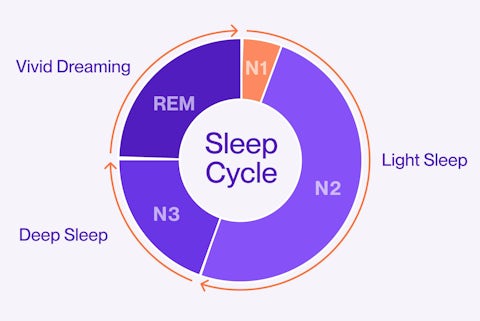How to Wake up With Energy – 9 Tips to Feel Well Rested
 Andrew Jolie March 26, 2024 9 min read
Andrew Jolie March 26, 2024 9 min read
It’s a familiar story: a whole night's sleep, yet you wake up feeling like the Sandman has shortchanged you. Not to worry, though. This article is packed with practical, snooze-busting solutions to kick-start your mornings. Let’s turn those slow mornings into a launchpad for a day filled with energy.
Why Am I Not Feeling Rested After Sleep?
Dragging through the day with heavy eyelids isn’t about sleeping long enough; sometimes, the quality of sleep is the issue. Let’s break down the usual suspects behind why your sleep might feel more like a timeout than a restorative retreat:
- Poor Sleep Quality: Think of it as eating a huge meal but still feeling oddly unsatisfied. Your brain and body go through several crucial stages during sleep, and if these are interrupted or cut short, you’ll wake up feeling like you’ve been shortchanged.
- Sleep Disorders: These can range from insomnia, sleep apnea (where you temporarily stop breathing in your sleep – spooky, right?), to restless leg syndrome. These disorders can turn what’s supposed to be a peaceful slumber into a night of tossing, turning, and frustration.
- Lifestyle Factors: That late-night espresso shot, the Netflix binge until 2 AM, or even stress can hijack your sleep quality. Your daily habits have a VIP pass to influence how well you sleep and, subsequently, how fresh you feel in the morning.
9 Tips to Wake up With Energy
Tip 1: Establish a Consistent Sleep Schedule
Establishing a sleep schedule that's consistent is important for tuning your body's internal clock, or circadian rhythm, making sure you fall asleep faster and wake up more refreshed. By going to bed and waking up at the same times daily, you help your body predict and prepare for sleep, enhancing the quality and reducing the time it takes to drift off. This regularity improves your ability to wake up feeling alert and plays a key role in mood regulation, appetite control, and immune function. Essentially, sticking to a set sleep schedule is like setting the tempo for your body’s daily performance, optimizing your health and well-being in the process.
Tip 2: Create a Pre-Sleep Routine
Crafting a pre-sleep routine is like gently guiding your body and mind towards a state of relaxation, priming you for a night of deep, restorative sleep. Activities such as reading a book or soaking in a warm bath can significantly ease the transition from the hustle and bustle of the day to the tranquility of night. These actions signal to your body that it’s time to wind down, engaging the parasympathetic nervous system, which helps lower heart rate and relax muscles. Other calming activities might include gentle yoga, listening to soft music, or meditation. By practicing rituals like these, you create a psychological and physical distinction between daytime activities and nighttime rest, enhancing both sleep quality and your ability to fall asleep quickly.
Tip 3: Optimize Your Sleep Environment
Optimizing your sleep environment is about crafting a sanctuary that says, "It's time to sleep," the moment you enter. Consider these elements as the cornerstones of a sleep-friendly bedroom:
- Temperature: Keep it cool, ideally between 60-67°F (15-19°C). Cooler temperatures signal your body it’s time to sleep.
- Noise: Aim for a quiet, or consistently low-noise environment. White noise machines or apps can help mask disruptive sounds.
- Light: Reduce light exposure as bedtime approaches. Use blackout curtains or an eye mask to block out light, mimicking the natural darkness your body craves for sleep.
Tip 4: Limit Exposure to Screens Before Bed
Cutting down on screen time before bed is essential for good sleep. The blue light from screens can mess with your sleep cycle by reducing melatonin, the sleep hormone. This can make it harder to fall asleep and affect the quality of your sleep. To protect your sleep, try to turn off electronic devices at least an hour before bedtime. Opting for screen-free activities like reading or meditating can significantly improve your ability to fall asleep faster and enjoy a more restful night.
Tip 5: Engage in Regular Physical Activity
Regular physical activity does wonders for your sleep and energy levels. It not only helps you fall asleep faster but also deepens your sleep, so you wake up feeling more refreshed. Make sure you time it right, though. Exercising too close to bedtime can be stimulating, potentially delaying sleep. Aim for morning or early afternoon workouts to boost your daytime alertness and to enjoy a natural wind-down in the evening, setting the stage for a restful night.
Tip 6: Mind Your Diet
Your diet plays a significant role in how well you sleep. Limiting caffeine intake in the afternoon and evening helps prevent sleep disturbances, as caffeine can stay in your system for hours. Alcohol can also mess up your sleep. Avoiding heavy or rich meals close to bedtime ensures your body isn’t working overtime on digestion when it should be winding down. Opt for lighter, healthier meals and consider a soothing herbal tea instead, to enhance your sleep quality.
Tip 7: Consider a Sleep Aid Device
To enhance your morning routine and wake up feeling energized, consider integrating a specialized sleep aid device like the Bía Smart Sleep Mask. This innovative mask uses a sunrise wake-up function to simulate the natural rising sun, gradually increasing light to gently wake you up. This method aligns with your body's natural circadian rhythms, promoting a more natural and refreshing wake-up process. By incorporating the Bía Smart Sleep Mask into your sleep habits, you can enjoy the benefits of waking up in a way that leaves you feeling more alert and ready to start your day.
Tip 8: Practice Mindfulness and Relaxation Techniques
Incorporating mindfulness exercises or meditation into your evening routine can be a game-changer for reducing stress and enhancing sleep quality. These practices help calm the mind and prepare the body for rest, making it easier to drift off to sleep. Consider trying the following techniques:
- Guided Meditation: Listening to a guided meditation can help steer your thoughts away from the day's stressors, easing you into a state of relaxation.
- Deep Breathing Exercises: Simple deep breathing techniques can significantly lower your heart rate and relax your body, telling it that it’s time to wind down.
- Body Scan Meditation: Progressively tensing and relaxing different muscle groups can release physical tension and promote a sense of bodily calm.
Tip 9: Evaluate Your Sleep Health
If you've fine-tuned your sleep habits but still struggle to catch quality sleep, it might be time to consider underlying issues. Undiagnosed sleep disorders, such as sleep apnea, insomnia, or restless leg syndrome, could be disrupting your rest. These conditions not only affect your sleep quality but can have broader impacts on your health and well-being. Don't let undiagnosed sleep disorders shadow your days and nights. Seeking professional advice can shed light on these issues, offering diagnoses and tailored solutions. Remember, addressing sleep concerns with a healthcare provider is a step toward reclaiming the restorative sleep your body and mind deserve.
FAQs About Waking up Refreshed
Why Is It Difficult for Me to Wake Up?
Struggling to wake up can stem from various factors, both medical and lifestyle-related. Conditions like sleep apnea, insomnia, or hormonal imbalances could be at play, disrupting your sleep cycle and making mornings particularly challenging. Lifestyle habits—such as inconsistent sleep schedules, excessive screen time before bed, and high caffeine consumption—can also make it harder to wake up refreshed. Evaluating and adjusting these factors can significantly improve your morning wakefulness.
Why Do I Never Wake up Feeling Rested?
Not feeling rested after sleep often boils down to the quality versus the quantity of your rest. Even if you spend enough hours in bed, disturbances in your sleep cycle, such as waking frequently during the night or experiencing shallow sleep, can leave you feeling unrefreshed. Factors like stress, an uncomfortable sleep environment, or going to bed too late can all impact the restorative stages of sleep, affecting how energized you feel in the morning.
What Gives You Energy in the Morning?
Several morning habits can naturally boost your energy levels:
- Hydration: Drinking water first thing after waking up rehydrates your body and kick-starts your metabolism. Keep a glass of water on your nightstand and drink it as soon as you wake up in the morning.
- Healthy Breakfast: A nutritious breakfast provides essential nutrients and energy to start your day right. Eating a good protein-filled breakfast can work wonders for your brain and energy levels.
- Natural Light Exposure: Sunlight cues your body to suppress melatonin production, helping you feel more awake and alert. Get out into the sun first thing in the morning if you can for about 20 minutes.
- Move Your Body: Combine getting sunlight with a walk, so you kill two birds with one stone. Do a little dance while you’re making your breakfast.
How Do I Get Rid of Grogginess in My Wake up?
To combat morning grogginess, try these immediate post-wake-up activities:
- Stretch or Exercise: Light physical activity can increase your heart rate and blood circulation, shaking off the sleep inertia. So get up and get moving for 30 minutes every day. Try dancing in your kitchen for a morning energy boost.
- Cold Water Splash: Splashing your face with cold water, drinking a glass of water or taking a cold shower can help stimulate alertness and reduce grogginess. If you’re really daring, try a cold-plunge. That’ll certainly wake you up!
- Structured Morning Routine: Establishing a consistent morning routine can help your body recognize it's time to wake up and get moving. Get up, don’t hit snooze, and move your body right away.
Why Am I Still Tired After a Full Night's Sleep?
Continued tiredness despite a full night's sleep might indicate deeper issues, such as:
- Stress: Chronic stress can spike your cortisol levels and interfere with sleep quality, preventing deep, restorative sleep stages. So make sure to reduce your stress levels.
- Sleep Apnea: This condition interrupts breathing during sleep, significantly affecting sleep quality. Consider talking to a doctor about a CPAP machine.
- Inappropriate Sleep Environment: Factors like an uncomfortable mattress, noise, temperatures that are too hot or cold, or noises from the street, can disrupt sleep even if you spend enough hours in bed.


